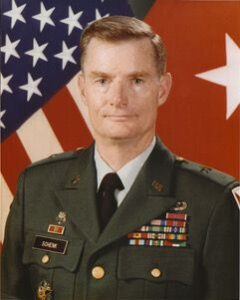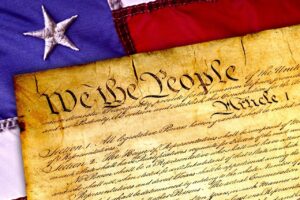Note: Often lost amidst the baseless claims of immigrants eating cats and dogs, is a serious discussion of the importance of foreign policy in the upcoming presidential election. The significance of American alliances around the globe is not receiving the attention it deserves. There are two very different visions of America’s role in the world on the ballot this November. One of the brightest minds that I know on this topic, my former college fraternity brother, Retired Brigadier General Donald F. Schenk, stopped by the porch this week to shed some light on this discussion.
By Donald F. Schenk, BG, USA (Ret)
There has been much intemperate and ill-advised rhetoric about our continued role in the North Atlantic Treaty Organization (NATO). We have all heard such unserious language as “Europe is free-loading” and “they are ripping us off,” as well as direct encouragement to Russians to “do whatever the hell they want” to those who don’t meet their financial commitments. Transactional approaches to international relations and global security serve no one’s interests.
 Let’s be clear. NATO does indeed matter.
Let’s be clear. NATO does indeed matter.
At the risk of being branded Europhiles, we would all do well to reflect upon our heritage and its significance to our cultural identity. A point rarely made in discussing America’s continuance in NATO is that, as a country that saw the end of the Cold War we might hesitate to continue Cold War alignments in the post-Cold War world, we cannot discontinue our cultural identity. Such cultural identity defines America’s place in world politics and its place among both our friends and enemies. The on-going success of NATO derives from its being the central security organization of Western countries with common values and philosophical assumptions. With the Cold War over, NATO has one central and compelling purpose—to ensure the Cold War stays over—by preventing the reimposition of Russian political and military control over Europe. Abandoning NATO is an abandonment of our most important cultural alignment the very foundation of which is our European identity.
Presuming we know the major brush strokes of the history of NATO, we might forget that NATO conducted combined combat and support operations in Afghanistan in support of the United States following the terrorist attacks on our soil twenty-three years ago. We might not realize that NATO’s Strategic Concept defines a regional alliance with global interests and recognizes the significant threats to the security of the 32 member nations, not the least of which is Russia, but also transnational terrorism by state and non-state organizations, the fragility of the Middle East and Africa, erosion of arms control, and climate change.
Some would argue that participation in this alliance is at odds with the wisdom of the Founding Fathers. To be clear, President Washington encouraged us to steer clear of permanent alliances and President Jefferson cautioned us about entangling alliances. However, both these men lived in a different time in a vastly different country, under unimaginable circumstances. America was still finding its legs as a country, and while transnational threats existed, they moved at 24 not 24,000 kilometers per hour. Time and circumstance have changed significantly since then; our security needs and leadership roles have changed as well. There is no going back.
Fathers. To be clear, President Washington encouraged us to steer clear of permanent alliances and President Jefferson cautioned us about entangling alliances. However, both these men lived in a different time in a vastly different country, under unimaginable circumstances. America was still finding its legs as a country, and while transnational threats existed, they moved at 24 not 24,000 kilometers per hour. Time and circumstance have changed significantly since then; our security needs and leadership roles have changed as well. There is no going back.
Membership and leadership in NATO provide benefits for America that are too often lost in our rush to see the world on a strictly regional basis. Membership in NATO affords the US flexibility to address other challenges in China, Korea, the Middle East, and South America. So long as we treat our NATO allies as partners, not tenants, we can rely on them to carry significant loads in Europe while we look to our important interests in these and other areas.
Leadership in NATO also means we have the ability to dampen actions of our friends who, without such an alliance, might aspire to independent action not in the best interests of the region. Imagine how an independent Poland might have reacted to Russia’s continued invasion of Ukraine in 2022. Membership in NATO ensured unified multinational action that continues today to check Russian designs. Those operations have been bolstered by the expansion of NATO through the recent additions of Finland and Sweden as Baltic bulwarks against Russia.
 The United States, as the sole remaining global power within NATO, has an outsized role, well above “first among equals.” Our allies look to us for leadership, not retrenchment, in these times of uncertainty. In exchange we receive outsized benefits in terms of basing rights, overflight rights, training opportunities, sales of military equipment which result in jobs here in America. We are not bargaining about the price of a rug in the souk. Instead we are doing what reliable, predictable, and respected governments do: we are fulfilling our end of our commitments to the maximum extent possible without judging what others may or may not be able to do because of their current circumstances. That is leadership. Threatening to abandon allies is cowardice.
The United States, as the sole remaining global power within NATO, has an outsized role, well above “first among equals.” Our allies look to us for leadership, not retrenchment, in these times of uncertainty. In exchange we receive outsized benefits in terms of basing rights, overflight rights, training opportunities, sales of military equipment which result in jobs here in America. We are not bargaining about the price of a rug in the souk. Instead we are doing what reliable, predictable, and respected governments do: we are fulfilling our end of our commitments to the maximum extent possible without judging what others may or may not be able to do because of their current circumstances. That is leadership. Threatening to abandon allies is cowardice.
Donald F. Schenk is a retired Brigadier General in the United States Army. He may be reached at schenkdf@aol.com.
Don Mohler is the former Baltimore County Executive and President and CEO of Mohler Communication Strategies. He may be reached at don@donmohler.com.
Subscribe
Enter your email to receive updates for new articles.
